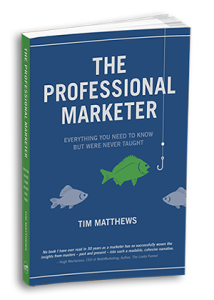Estimated Reading Time: 2 minutes
I was recently at a tech marketing conference in San Francisco, and I once again heard a line from a founder that made me sigh. The trope used to make me groan, but I’ve heard it so often that now I merely sigh and shake my head.
Here’s the line: At our startup we don’t do marketing. We just build a great product, and the rest takes care of itself. Sigh. It’s just complete BS. Here’s why.
Most people don’t understand that product is an essential component of marketing – the first of the 4 Ps of marketing, defined by Jerome McCarthy decades ago. They are as relevant now as they ever were. The other three Ps are price, place and promotion. We’ll get to how these are applied in just a minute, but the reason many founders claim not to be doing marketing – in addition to bravado – is that they don’t really understand what marketing is. There is more involved in marketing than writing press releases and paying for advertisements. Marketing starts by understanding what customers need or want, and building a product to suit that need or want.
What’s really going on at these startups in marketing denial? Let’s take a closer look through the lens of McCarthy. First at product. You’ve got to build the right one. So, a founder making the claim that all they do is build a great product is saying that her company…does great marketing (or at least the first step in great marketing).
The second, place, is where you sell your product. Do you sell it online? Do you sell it in retail stores? Or  are they your stores, as with Apple’s go-to-market strategy? Deciding where you’re going to sell a product is as important as anything else you do and how you approach the market, a.k.a. marketing.
are they your stores, as with Apple’s go-to-market strategy? Deciding where you’re going to sell a product is as important as anything else you do and how you approach the market, a.k.a. marketing.
The third aspect – price. I hear a lot about freemium as if it’s a brand new thing. Giving stuff away for free is a tried and true marketing tactic. It’s been used for a long, long time. Freemium is a marketing strategy. Getting people to try your product for free, avoiding buyer remorse, and therefore exposing it to more people who might not otherwise even give it a whirl? That is a marketing strategy revolving around price. Subscription pricing, commonly used by SaaS vendors, reduces sticker shock and allows faster transactions by shifting the buying center from IT to the line of business. Or, how about the App market and in-game purchases – is this not the old razors and razor blades strategy?
Finally, promotion. This is the very limited, narrow view of marketing that most startups and their boards think of. Of course you’ve got to do promotion, but it’s clear that some people don’t think that promotion includes thing like blogs or practicing SEO. These are newer online tactics, but they’re promotional tactics. These are how people find your product and how you promote your company. It doesn’t matter that you’re not doing press releases, or you’re not going to large trade shows. If you go to meetups in San Francisco or in New York or in London, you are going to events filled with potential buyers. It’s the same technique, merely a different venue.
If you run a startup, think more about marketing writ large, not just promotion The 4 Ps are here to help you. You may no longer practice what you might call “traditional marketing.” It’s okay if you shun the press release, don’t believe in big events and don’t sell through a distributor. But, think about how you can use the 4 Ps to further the reach and exposure of your product.
Take the example of a fledgling hardware company that years ago started with a great product but needed a way to break away from the pack. There was this new medium called radio. The founder decided that his company would be the first company ever to advertise over the airwaves. That was in 1923, and now Bulova (since acquired by Citizen) is one of the top ten watchmakers in the world.
What do you think? Believe you can grow a startup without marketing?

 Want to learn even more about marketing?
Want to learn even more about marketing?